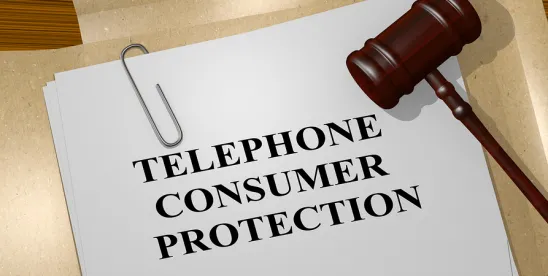In relevant part, the Telephone Consumer Protection Act (“TCPA) prohibits a caller from making any call (other than a call made for emergency purposes or made with the prior express consent of the called party) using an automatic telephone dialing system (ATDS) to any telephone number assigned to a cellular telephone service. 47 U.S.C. § 227(b)(1)(A)(iii). That is, a caller may not use an ATDS to place a call or send a text message to a cell phone without the recipient’s prior express consent. The type of consent depends on the nature of the call or text. And, while consent generally can be revoked by any reasonable method, some courts recently have considered whether revocation may be restricted in circumstances where the consent is included on a bilateral agreement.
REQUIREMENT OF CONSENT
When consent is required, two types of “prior express consent” under the TCPA may be implicated. Prior express consent is required to place autodialed, non-solicitation calls or texts to a cell phone. Prior express written consent, a heightened form of consent, must be evidenced by a written agreement signed by the call recipient and is required in order to place autodialed telemarketing/advertising calls or texts to a cell phone. The written agreement must include a clear and conspicuous disclosure informing the consumer signing that (1) by signing the agreement, the consumer is authorizing autodialed telemarketing or advertising calls or texts, and (2) the consumer is not required to sign the agreement as a condition of purchasing any property, goods, or services. The proper treatment of these key requirements is crucial for TCPA compliance.
Simple prior express consent can be written or verbal. Voluntarily providing one’s cellular number also constitutes prior express consent where (1) the individual gives “prior express consent” to be called or texted at the number provided (2) he/she has provided their number to the party calling or texting them, and (3) there is some relation between the communications and the reason for which an individual provided their number. “For non-telemarketing and non-advertising calls, express consent can be demonstrated by the called party giving prior express oral or written consent or, in the absence of instructions to the contrary, by giving his or her wireless number to the person initiating the autodialed or prerecorded call.” In re Rules & Regulations Implementing the TCP Act of 1991 et al., 30 FCC Rcd at 7991–92.
Prior express written consent is required for calls or texts to cell phones that introduce an advertisement, or constitute telemarketing and are sent using an ATDS. An “advertisement” is defined by the Code of Federal Regulations as “any material advertising the commercial availability or quality of any property, goods, or services,” and “telemarketing” is defined as “the initiation of a telephone call or message for the purpose of encouraging the purchase or rental of, or investment in, property, goods, or services, which is transmitted to any person.” 47 C.F.R. § 64.1200(f)(1), (12). The content helps determine whether the calls or texts are advertisements. The TCPA’s advertising prong merely requires introducing at the most basic level the commercial availability of a service. In similar fashion, “telemarketing” occurs when the context of a text or call indicates that it was initiated and transmitted to a person for the purpose of promoting property, goods, or services. Neither the TCPA nor its implementing regulations require an explicit mention of a good, product, or service where the implication of an improper purpose is clear from the context.
While consent can and most often occurs between the sender and recipient, courts have also recognized that consent can be communicated through intermediaries. An intermediary can convey consent but cannot provide consent for the recipient. For example, a court recently found that providing a cell number to a family member who used it to join a loyalty club was not consent of the actual phone subscriber.
THE DEVELOPING LAW OF REVOCATION OF CONSENT
While the nature and content of consent is not new in the TCPA, how and when it can be revoked is a developing concept. Generally, revocation of consent is controlled by the consenting party, and may be communicated orally or in writing by any reasonable means. However, where consent is contractually provided, as in credit agreements for example, the parties can bargain to require mutuality or particular revocation methods. Recently, a number of courts have addressed whether a consumer may unilaterally revoke consent when it is a term in a bargained-for contract. The law is unsettled, however, and the ability of consumers to revoke contractual consent to receive auto-dialed calls or texts is unclear.
In June 2017, the Second Circuit Court of Appeals held that a consumer may not unilaterally revoke consent in a bargained-for, bilateral contract. Reyes v. Lincoln Auto. Fin. Servs., 861 F.3d 51, 53 (2d Cir. 2017). The Reyes court based its decision in “black-letter” contract law, referring to a fundamental aspect of contractual relationships that one party cannot alter or revoke a term of a bilateral agreement without the other party’s consent. The court found that a consumer, having consented to be contacted via an auto-dialer, could not unilaterally revoke consent without the caller’s permission. Notably, the Second Circuit distinguished case law from the Third and Eleventh Circuits, where consumers retained their ability to revoke consent because it was given in credit applications, rather than as part of a bilateral contract.
The Middle District of Florida in Medley v. Dish Network, LLC, Case No. 8:16-cv-2534-T-36TBM, 2018 WL 4092120, at *10 (M.D. Fla. Aug. 27, 2018) held that consent provided by contract cannot be unilaterally revoked. The court noted that no provision in the TCPA indicates that contractually-granted consent can be unilaterally revoked where it would contradict black-letter law. The Medley court, in granting the defendant’s motion for summary judgment, held that a consumer who has consented to auto-dialed communication in a contract for services cannot later revoke such consent. In short, the court declined to subordinate the common-law notion that consent agreed to by contract cannot be unilaterally revoked in the absence of Congressional intent in the TCPA expressing otherwise. See also Harris v. Navient Sols., LLC, Case No. 3:15-cv-564 (RNC), 2018 WL 3748155, at *2 (D. Conn. Aug. 7, 2018) (rejecting the plaintiff’s argument that irrevocability of consent is contingent on the parties agreeing that consent is irrevocable. Rather, the court followed the Reyes rationale that prior consent is irrevocable even if the contract is “silent on revocation.”); Barton v. Credit One Fin., Case No. 16CV2652, 2018 WL 2012876, at *3–4 (N.D. Ohio Apr. 30, 2018) (holding that consumer’s attempted oral revocation was ineffective when contract required written revocation).
Some district courts, however, have not followed the Reyes lead. The Western District of Pennsylvania in McBride v. Ally Fin., Inc., Case No. 15-867, 2017 WL 3873615, at *2 n.4 (W.D. Pa. Sept. 5, 2017), declined to adopt Reyes “absent clearer indications in the law of [the Third] Circuit,” though it noted that Reyes “reflects a potential sea-change in the area of TCPA-litigation.” Similarly, the Middle District of Tennessee in Ammons v. Ally Fin., Inc., Case No. 3:17-cv-00505, 2018 WL 3134619, at *15 (M.D. Tenn. June 27, 2018), adopted the general rule that consumer consent may be revoked at any time by “any reasonable means.” The Ammonscourt, thus, held that consumers retain the ability to revoke their prior consent despite having a bilateral agreement with the caller. See also Few v. Receivables Performance Mgmt., Case No. 1:17-CV-2038-KOB, 2018 WL 5923765 at *1 (N.D. Ala. Nov. 13, 2018) (holding that the court should have relied upon binding Eleventh Circuit precedent allowing for revocation of consent in the absence of a contractual restriction on the means by which a consumer may revoke consent).
While a number of federal district courts across the country have followed the Second Circuit’s Reyes decision, the case law is plainly not unanimous. Consent provisions in consumer contracts may be a viable means of limiting exposure to the TCPA, but the extent to which such provisions reduce or even eliminate the risk of TCPA liability remains an area of continued legal development.




 />i
/>i
